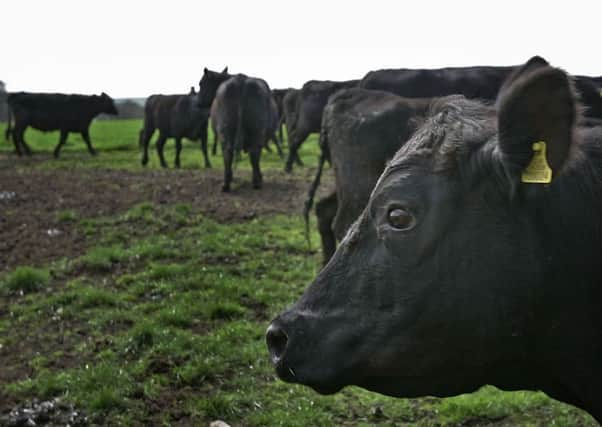Beefing up for sector's big day out in the Borders
This article contains affiliate links. We may earn a small commission on items purchased through this article, but that does not affect our editorial judgement.


Adopting the theme “Beef up your Profits”, the event will take place at Fans Farm, Earlston, Berwickshire, where hosts Douglas and Kelda Stewart and family will welcome the industry on Thursday 8 June.
The event is organised by a local committee of the Scottish Beef Association under the chairmanship of Sion Williams, farm manager at Bowhill Estate, who welcomed the enthusiastic participation of the Stewart family as host farmers.
• READ MORE: Farming news
Advertisement
Hide AdAdvertisement
Hide AdFans is a tenanted farm on the Mellerstain Estate and base for an extensive beef and arable enterprise extending to 2,000 acres and including a commercial suckler herd of 400 Aberdeen-Angus cows as well as the farm’s seed potato and cereal enterprises.
“The beef enterprise is an excellent example of an integrated mixed farming business based on home-grown feeding and the utilisation of farm yard manure for the growing of cereals and potatoes,” said Williams.
“The high standard of technical efficiency being achieved in producing a high-quality beef product, in terms of health, fertility, animal performance, output and meeting market requirements, makes Fans the ideal venue for this year’s Scottish Beef Event.”
Other features of the day will include a farm tour, trade stands, breed society exhibits, demonstrations, grassland management talk and seminar. The event will be opened by the Scottish Government’s cabinet secretary for rural economy and connectivity, Fergus Ewing.
David Hannon, area manager with the major sponsors Clydesdale Bank, urged all beef producers to make every effort to attend and to make the most of the opportunity to soak up knowledge.
“With a considerable amount of uncertainty around just now which is outside the control of the farming industry – such as Brexit and wider trade agreements – it is sensible for the producers to concentrate on optimising the areas which they can influence – such as technical efficiency, management measures and the uptake of new and developing technologies,” he said.
“The Beef Event will be an ideal opportunity to find the means to do this.”
Efficiency scheme questioned
Advertisement
Hide AdAdvertisement
Hide AdWhile the upcoming Beef Event will boast a full complement of breed society and trade stands, a late addition to its ranks is set to be a stall manned by the Scottish Government’s beef efficiency scheme (BES) team.
But whether it will be one of the busier stalls remains to be seen – as it became clear at a press preview of the beef event in the Borders yesterday that the industry has been somewhat underwhelmed by the details of the £45 million scheme – and the fact that, to many, it appears to lack clear aims and direction.
Neil McCorkindale, chairman of the Scottish Beef Association, said that while the sector had welcomed the move to encourage beef producers to improve their efficiency – and that such schemes were likely to play a part in the industry’s future – the BES had not hit the ground running.
Sion Williams – who had been instrumental in getting the BES team to sign up for a stand – said that producers had been wary of joining a scheme which still seemed to be at the development stage when it was launched, with more details and commitments continually emerging as time progressed.
• READ MORE: Farmers right to have a beef with efficiency scheme
He added that, especially on bigger units, the fact that the scheme was not compatible with the IT records already kept by many beef producers – meaning that details of each calf had to be keyed in individually – had been another shortfall.
Host farmer Douglas Stewart, who breeds and finishes close to 400 cattle each year, revealed that he had chosen not to join the scheme, describing it as “too fluffy” and claiming that he had the impression the scheme had been drawn up in a rush and that it was difficult to see exactly what it aimed to achieve.
And while he could have picked up more than £6,000 a year over the five years of the scheme, Stewart said that he hadn’t wanted to tie his business down to a programme which had aims which were unclear.
Advertisement
Hide AdAdvertisement
Hide Ad“We are determined to improve our practices – but we already gather the sort of information required by the scheme and it is better for us to use this to focus on the physical performance factors which are key to our own business. Simply producing another six calves a year would offset the income from the scheme.”